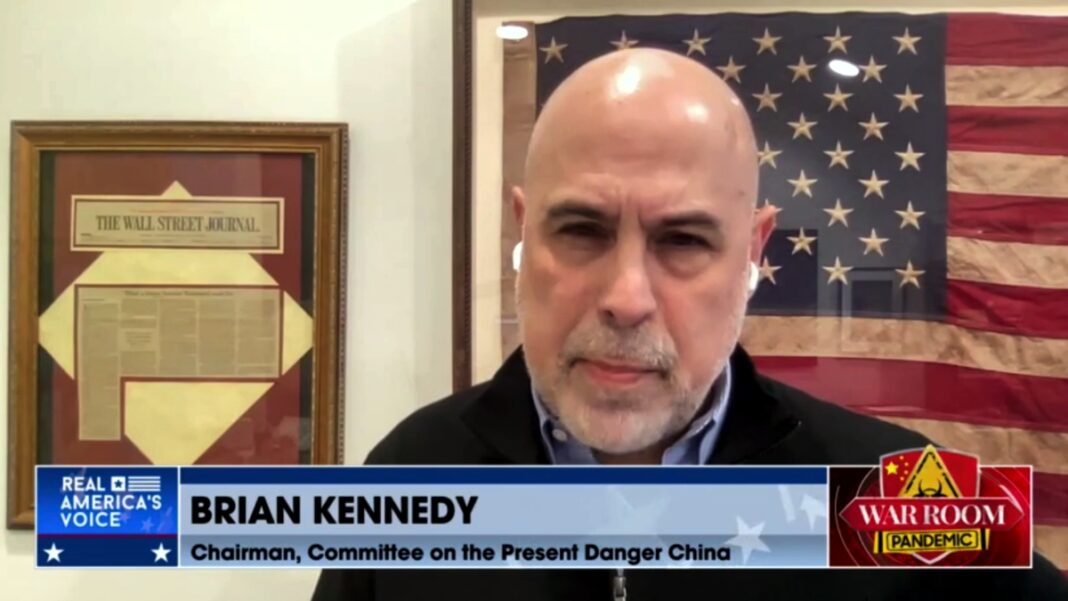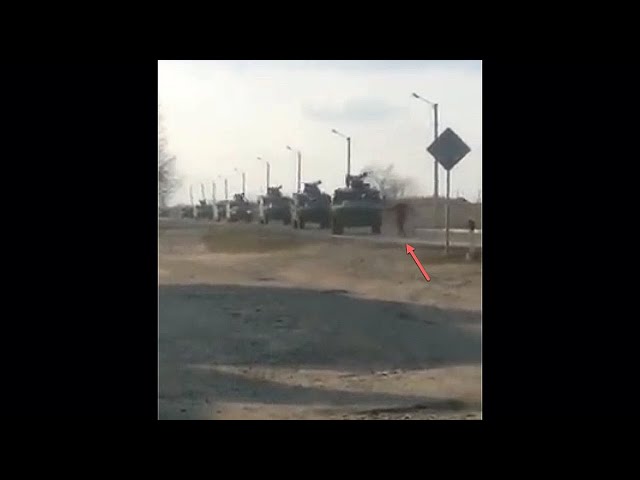
Brian Kennedy, chairman of the Committee on the Present Danger China, talks with host Steve Bannon about the crisis in Ukraine and what it means for America.
“If Ukraine is going to be free, it’s going to be the job of the Ukrainian people, and God bless what they’re trying to do there. But we need moral clarity of the kind that we’re not really seeing today about what it takes to defend this country.”
Read Kennedy’s article on “The Common Sense of the Ukraine Crisis” below video.
The Common Sense of the Ukraine Crisis
War with Russia over its expansionist rumblings would be a disaster.
Ukraine, a country on the border of Russia and a former part of the Soviet Union, is an improbable candidate for the sacrifice of American blood and treasure. Placing ourselves on the line for Ukraine risks the future of American civilization, especially since Russia’s and Communist China’s formal pledge to support one another in a February 4 agreement that strengthened their “bilateral strategic cooperation.” To be sure, Russia and China have been ideological and strategic allies since the 1920s; this new agreement signals that the situation in Ukraine is about to get serious.
Most Americans will take the sensible view, maintained from the American Founders to John Quincy Adams, that we are friends of liberty everywhere but guardians only of our own. However much we may want the people of Ukraine to enjoy freedom, it is not the obligation of the people of the United States to realize that goal for the Ukrainians. That is the principled view of American foreign policy that prevailed for most of our history.
The practical view is more stark.
Russia is a nuclear power with strategic and tactical nuclear weapons. Their arsenal is designed to wage in war in Europe, Asia, and, if necessary, destroy both the American military and the American homeland. They have advanced tactical and strategic missiles that can destroy American military forces, naval battle groups and, like Communist China’s recently tested rocket equipped with a hypersonic reentry vehicle, can orbit the earth, reenter the atmosphere, and either blast an American city or electromagnetically destroy the electrical infrastructure of the United States, ending life as know it.
This does not mean the Russians are supremely powerful. The United States has more than a capable military that can project deadly force anywhere on Earth. But what may start as a minor incursion into Ukraine could rapidly escalate into something much more serious. What happens if conflict does escalate between Russia and U.S. forces?
The United States has not engaged in actual combat on a large scale with a peer competitor for nearly 70 years, and we have not experienced mass battlefield casualties practically within living memory. The Russians possess tactical nuclear weapons and battlefield nuclear artillery. If they are committed to taking Ukraine, they would also be committed to winning, in which case they would not be beyond using these weapons. If they did and U.S. forces were killed, what might our response be?
Let us acknowledge that the United States does not possess a national missile defense capable of stopping Russian or Chinese nuclear ballistic missiles or even an Iranian ship-launched missile. These are not secondary considerations, but are central to whatever strategic calculation the United States must make when it comes to how it deals with Russia or any other nation with such weapons.
Though we have the technological capacity, America has not built an effective space-based and multilayered missile defense capable of protecting the United States. Despite Russia’s and China’s protestations, our rudimentary missile defense system is, at best, capable of stopping a limited number of North Korean missiles. For 40 years, Joe Biden—a long-time opponent of missile defense—and the Democrat establishment have opposed the necessary investments in our national security that would have provided us with an umbrella defense against nuclear missile attack. If we had a functioning political order we would be working on a national missile defense—even with the technological challenges posed by hypersonic reentry vehicles and tactical nuclear weapons—with a Manhattan Project level of seriousness, as if our very lives depended on it. To be sure, the Russians and the Chinese have no qualms about building their own missile defenses and space-based capabilities.
That we have failed to do so sends a message to the Russians and the Chinese that the United States is not to be taken seriously when it comes to warnings about Ukraine or Taiwan or any strategically significant spot in the world. From their point of view, if America is not serious about its own national survival why would anyone think it was serious about the survival of Ukraine?
That Americans must listen to senators and congressmen of both parties discuss the deployment of U.S. ground troops in Eastern Europe, and throw around hypotheticals such as the use of nuclear weapons against Russia, is the height of absurdity. Even if war were somehow in the U.S. national interest, no serious person would suggest it without first ensuring that a national missile defense was capable of defending the homeland and our forward deployed troops abroad.
What then are we to make of a possible war in Ukraine? Despite the tough talk by Secretary of State Antony Blinken, Russia surely knows that it’s only rhetoric since in the first year of the Biden Administration, Russia, a supposed enemy, was treated better than any American ally.
The hallmark of the Trump Administration’s policy toward Russia was dogged pursuit of total energy independence by opening up American production of oil and gas. Given that Russia’s main industry is oil and gas, Trump made the Russians less wealthy and less capable of playing the role of aggressor in European affairs. In 2021, the first act of the Biden Administration was to close the Keystone XL Pipeline, reducing the global supply of oil that led to higher prices for U.S. consumers. These higher prices benefited the Russians who saw oil and gas revenues rise by almost 50 percent. Then the Biden Administration removed sanctions from the companies building the Nord Stream 2 Pipeline supplying Russian natural gas to Germany, making our NATO ally more closely aligned with and dependent on Russia. So, despite being vilified by American politicians and the regime media, Russia has strangely had its way with the Biden Administration at nearly every turn.
This kind of diplomacy may well lead Vladimir Putin to the conclusion that he can push Joe Biden around and that the Biden Administration is now merely posturing for domestic political consumption. In other words, given the Russian military buildup on the Ukrainian border, Putin believes Joe Biden is bluffing when he deploys U.S. troops to Eastern Europe. Putin wants Ukraine and believes that the United States will not stop him.
Putin has seen that Communist China unleashed Covid-19 on the United States, that over 850,000 Americans died, that the U.S. economy and political system were devastated, and that Beijing literally got away with murder. Putin saw Biden ignominiously withdraw U.S. forces from Afghanistan and leave $85 billion in military equipment and Bagram Air Base for use by our enemies. Putin might be led to believe that the Biden Administration is withdrawing the U.S. from the world stage and embracing a globalist vision where the United States is but one more nation in a multi-polar world, and he would have good reasons to believe it’s so. There can be little wonder that Putin signed the strategic agreement with Xi Jinping when he did.
Finally, some have suggested that this is Joe Biden’s “wag the dog” moment to distract from his failed economic and Covid-19 policies here at home. Normally one does not play such games with nuclear superpowers. Now is the time to get serious about our own defense—from missile defense to the state of our armed forces—rather than believing that war in Ukraine is in our national interest. We can only pray that it’s not too late.
Feb. 8, 2022
About Brian Kennedy
Brian Kennedy is president of the American Strategy Group; he is a Senior Fellow, board member, and former president of the Claremont Institute.






